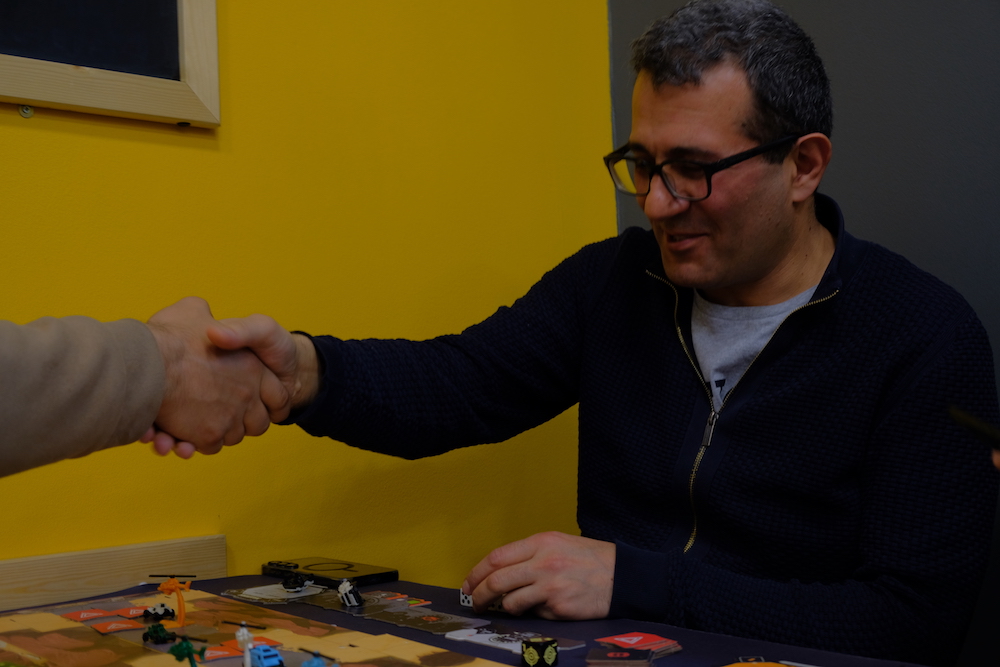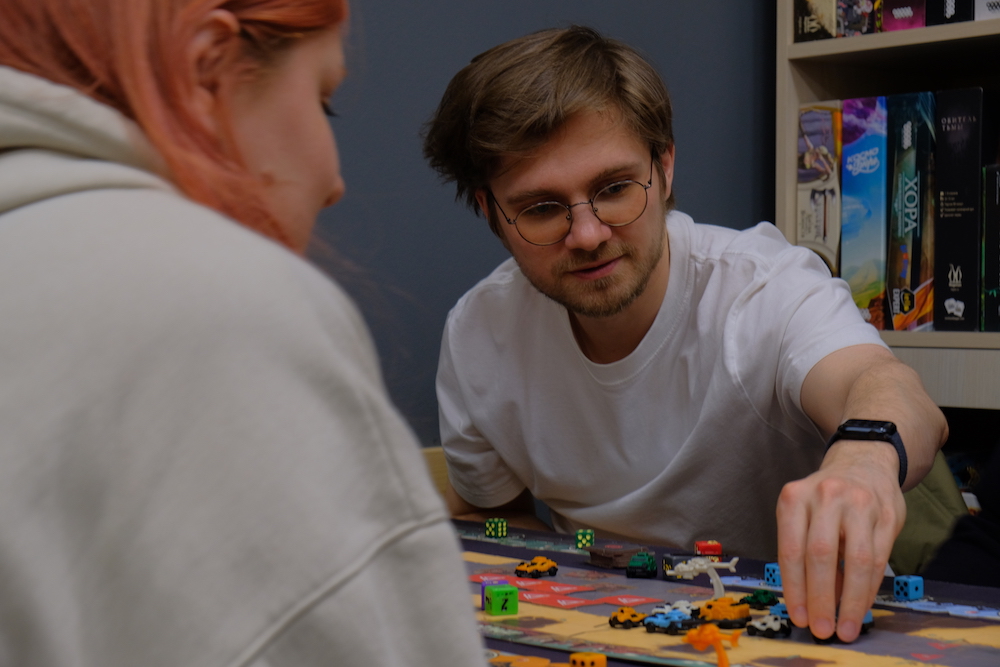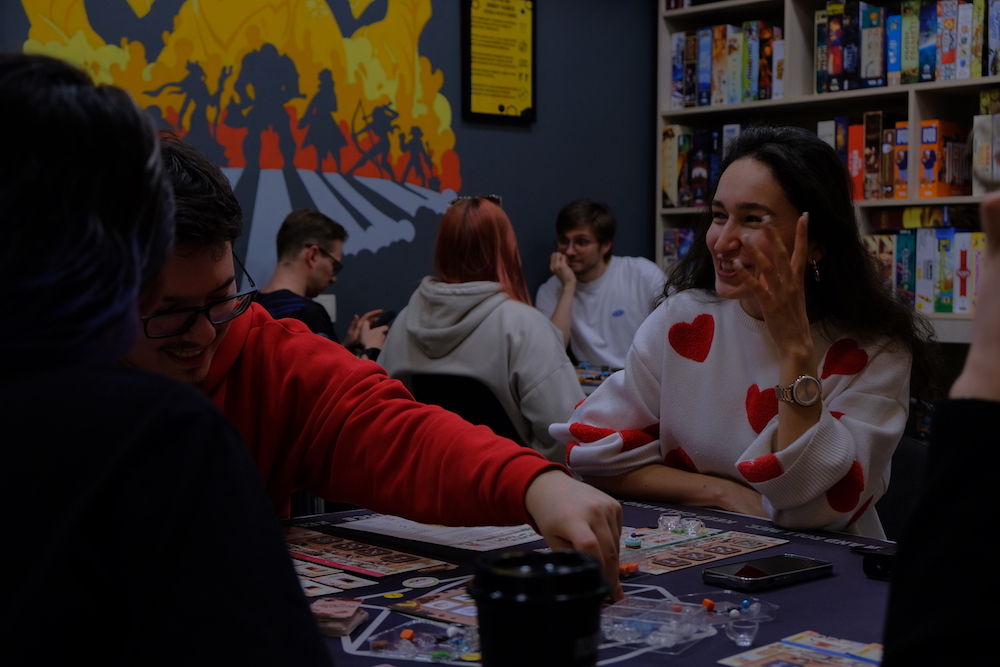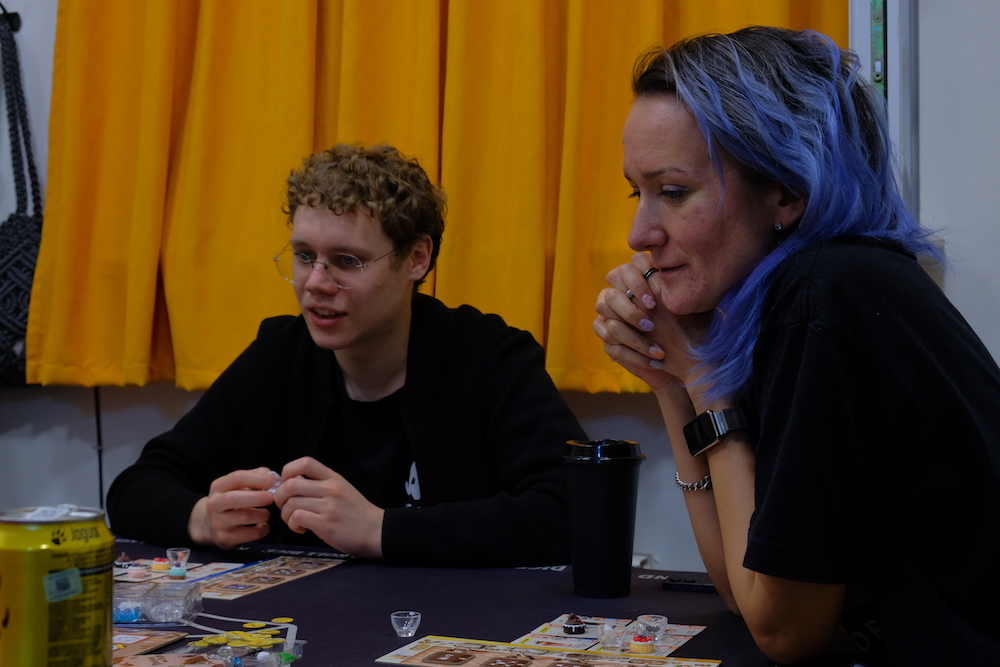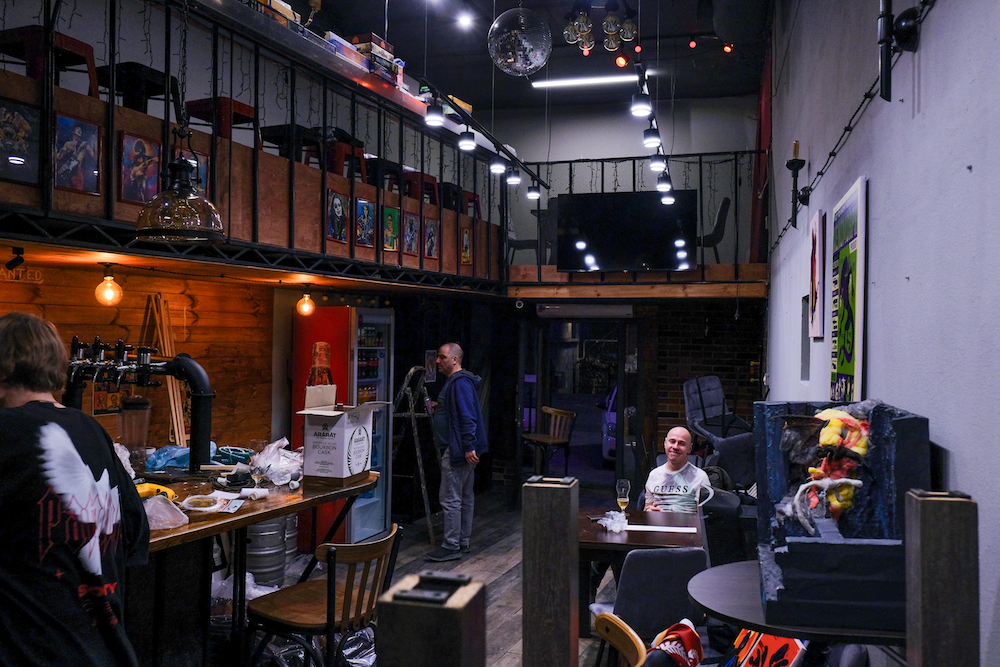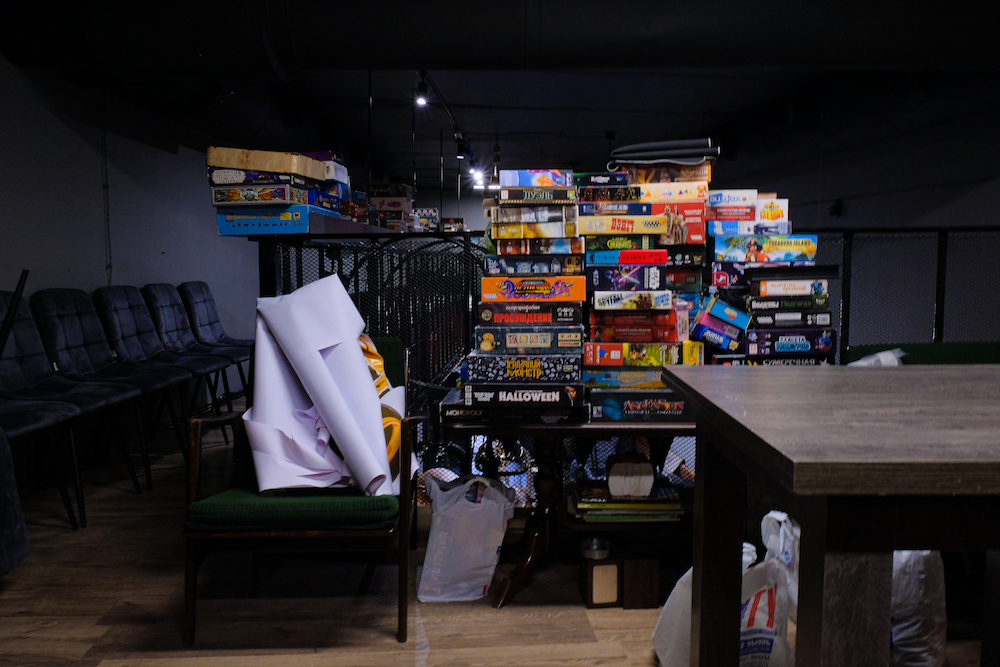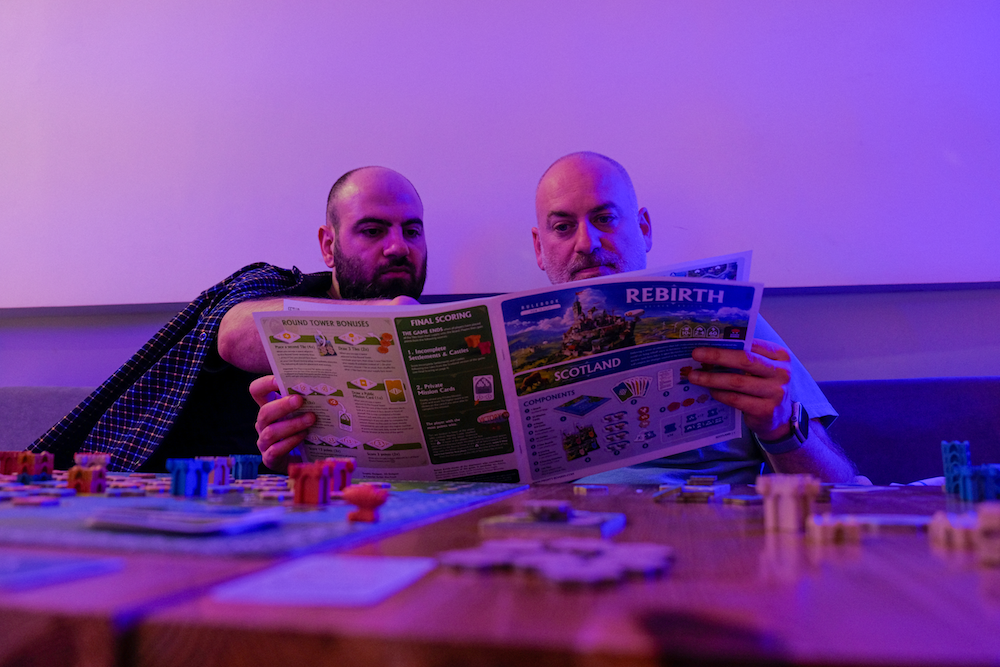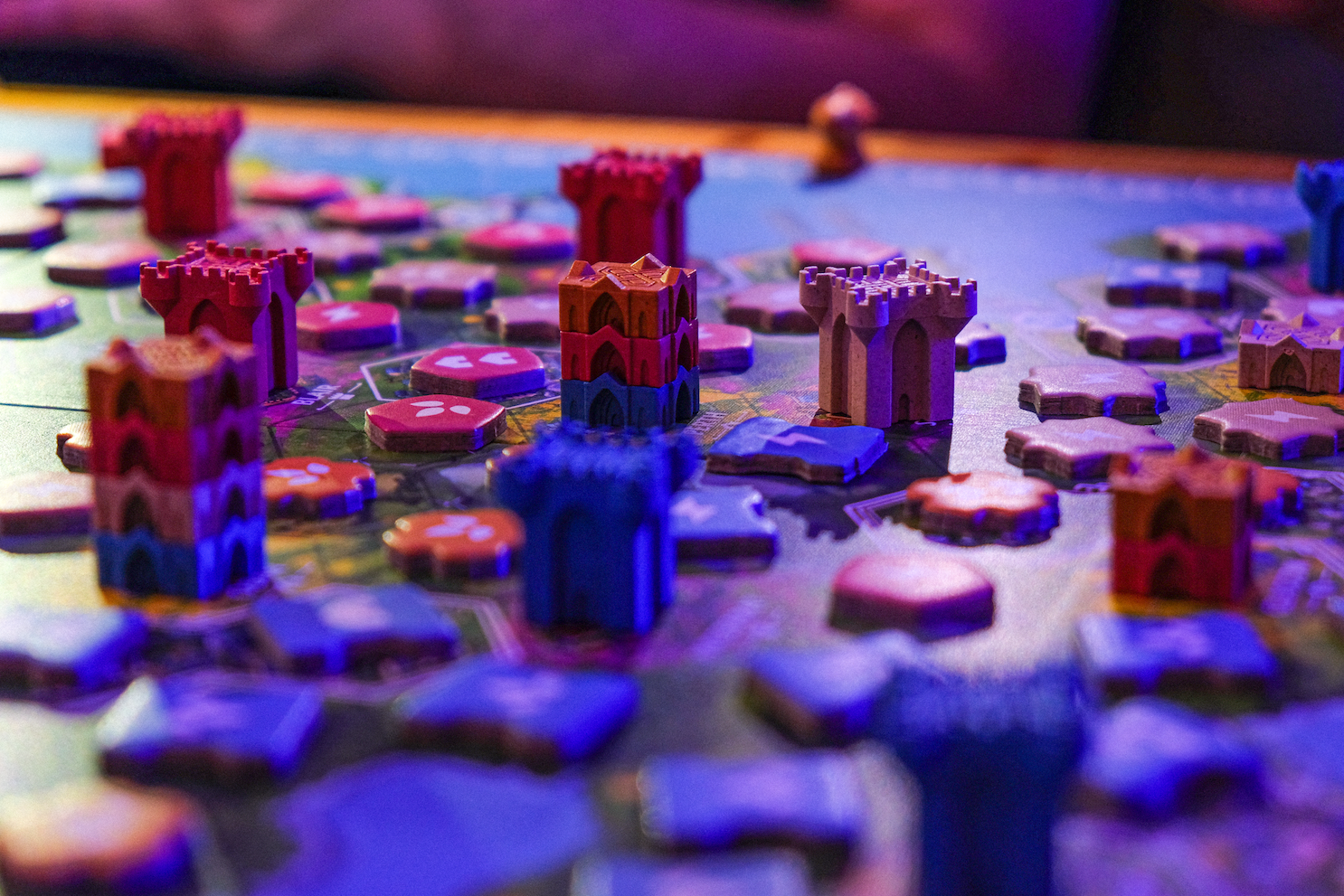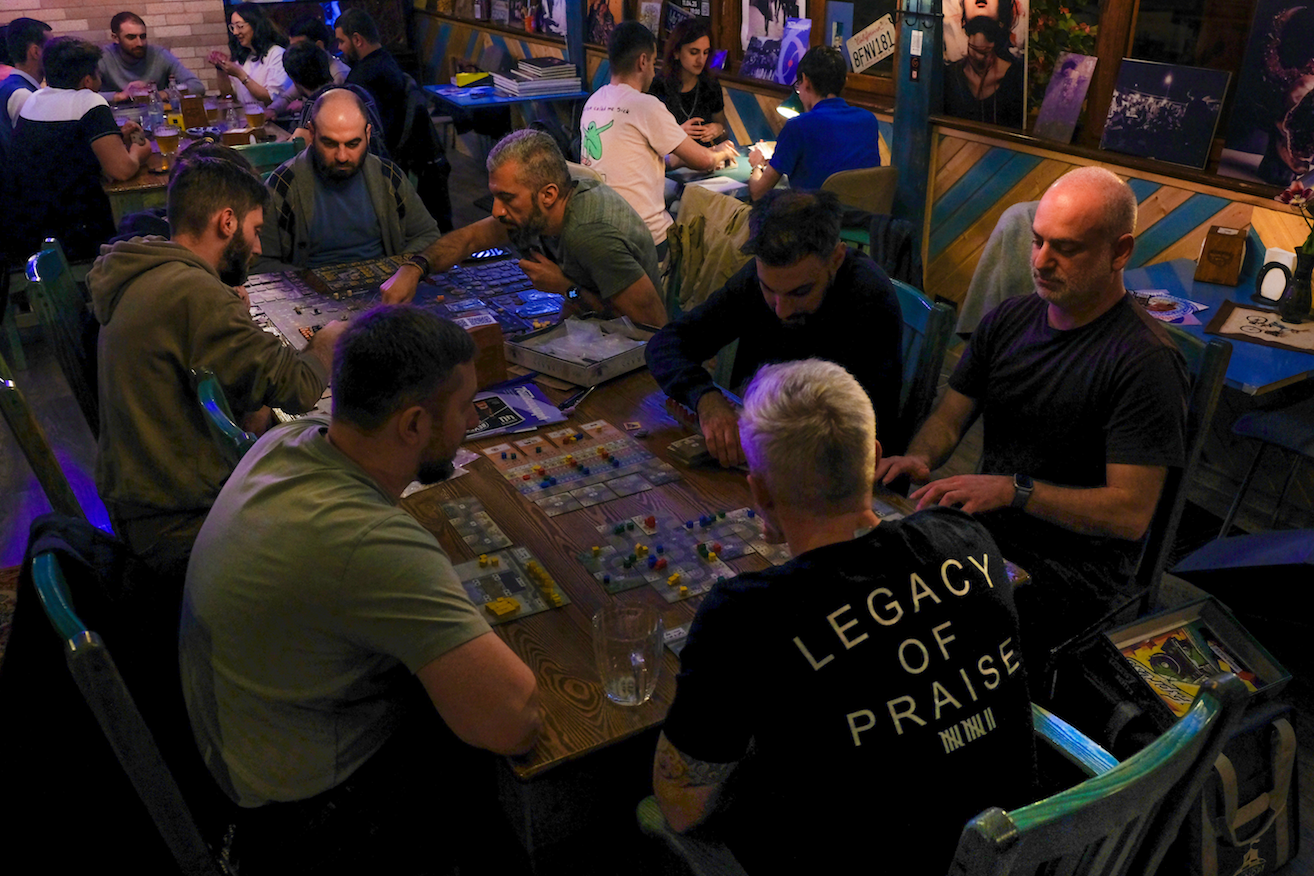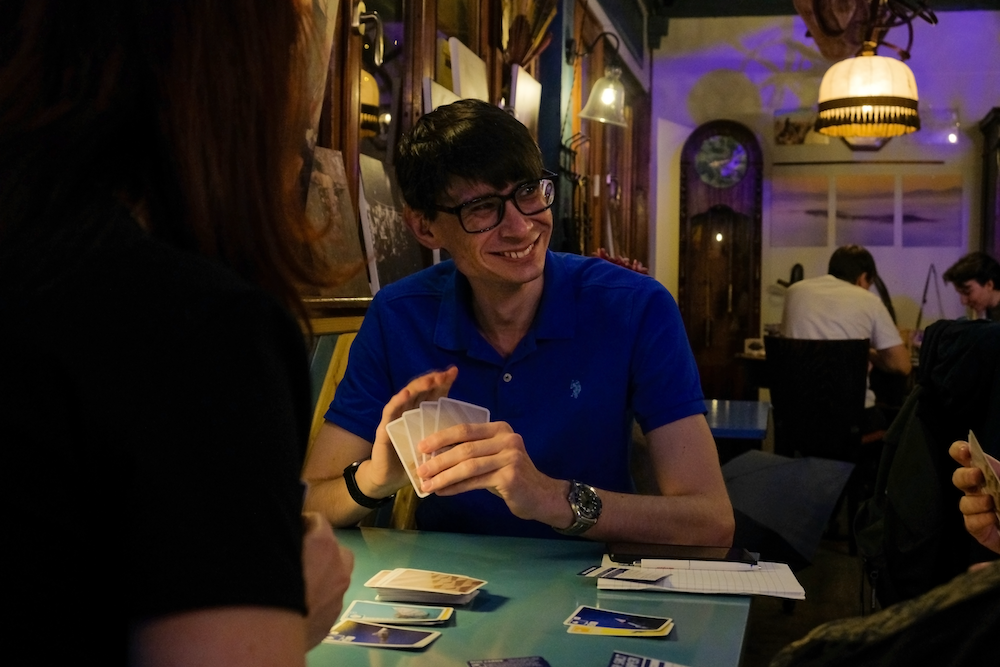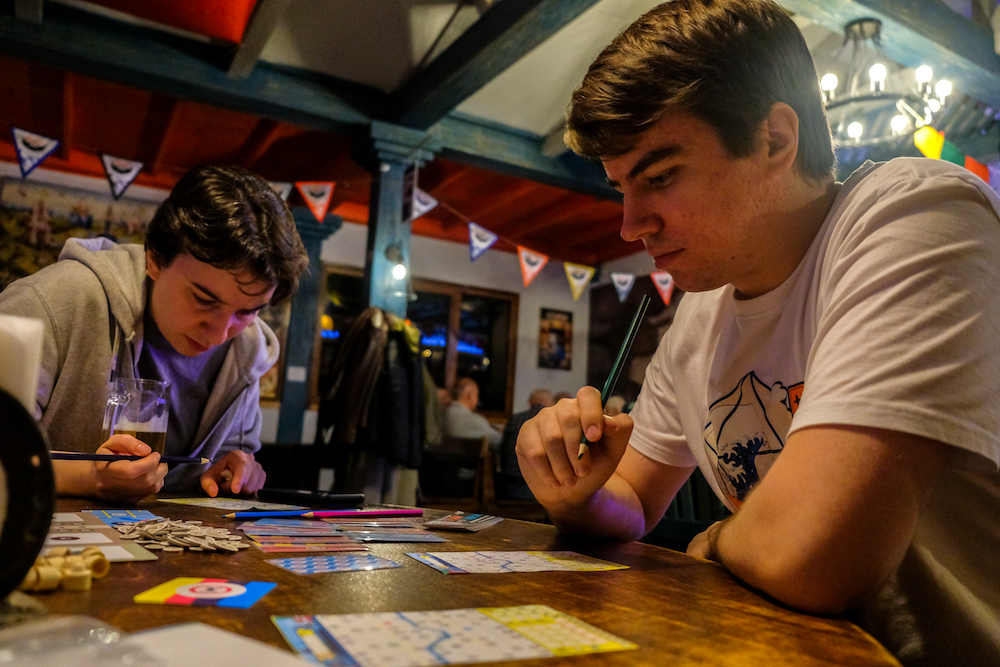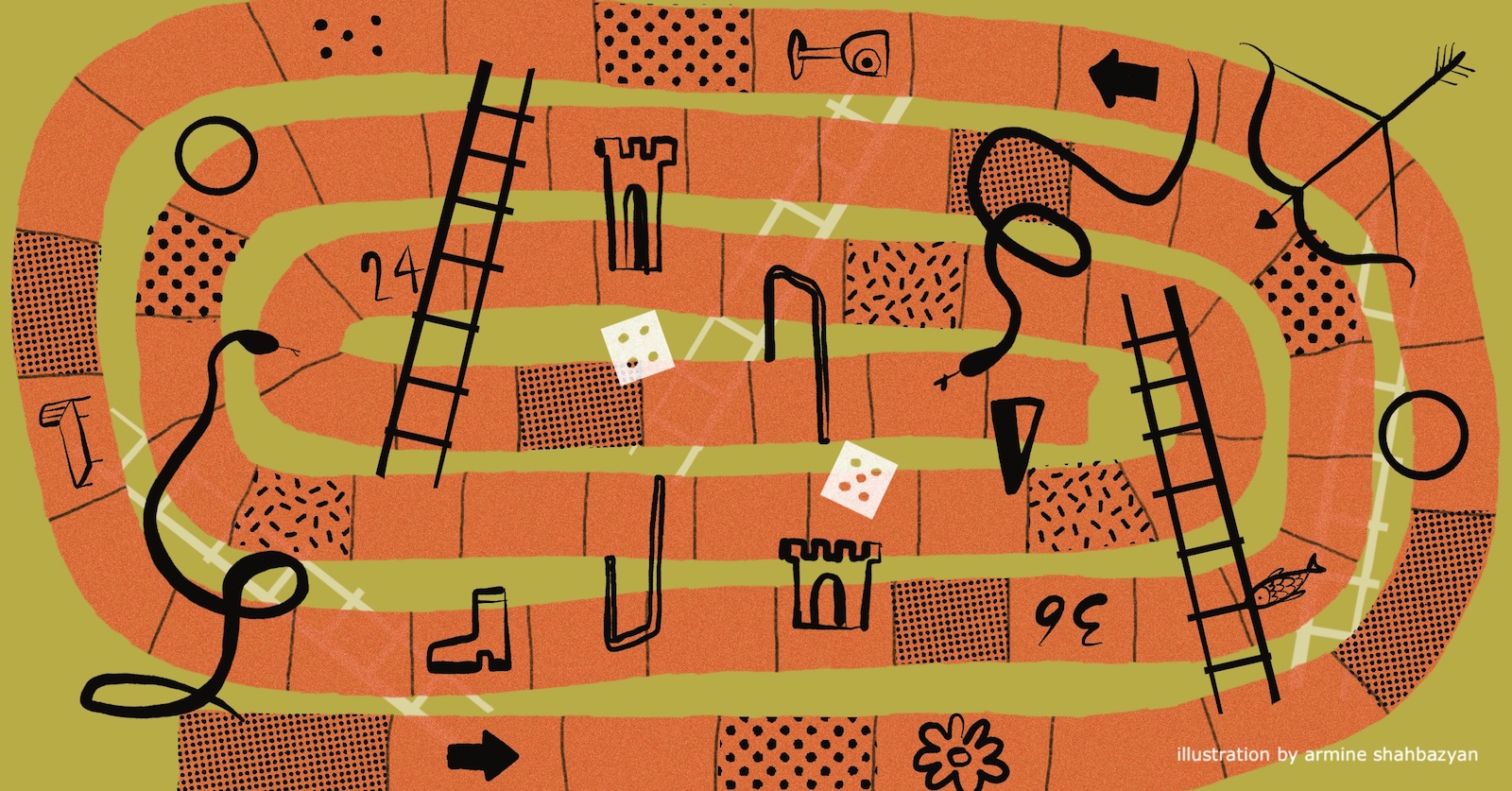
My body tingles with anticipation while waiting for that final number in Lotto. My heart drops when someone threatens to take the last road I need in Ticket to Ride. It’s just cardboard and plastic, but still, it feels personal. I love board games, even though I’ve only played a handful. The thrill of winning and losing is addictive. Both are exciting (especially winning and watching everyone else lose). Still, playing board games has been just a fun way to occasionally pass time in my social circle, and nothing more.
Meanwhile, in Yerevan’s courtyards and parks, I had always seen grandpas deep in games of chess, checkers and backgammon, as part of their daily ritual. You’d pass them on your way to work, and they’d still be playing when you get back. I assumed this was the extent of Yerevan’s board game scene and never thought to explore further.
Then, one winter evening, while walking down Koryun Street, I spotted a sign: a black hexagon with a stylized hand and an eye at its center. It read “Intellect EVN.” The mysterious symbol made me stop in my tracks. My first instinct? This has to be a board game club! To be fair, this remarkable instinct of mine has led me astray in the past. But this time, I got lucky—though I had been completely wrong about Yerevan’s board game culture.
The discovery stuck with me. Later, I took a look at Intellect EVN’s Instagram page, which revealed an extensive network of Telegram group chats dedicated to board game clubs, casual meetups, and events. Their main chat alone had over 2500 members. Here was this thriving board game community, and I had completely missed it!
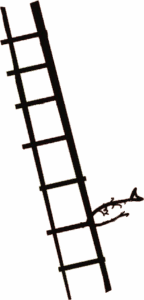
When I spoke with the club’s founder, Serob Ohanyan, he said they were temporarily closed, but planned to reopen in a new location in a couple weeks. Thank goodness I talked to him—otherwise, convincing my friends (and myself) that I hadn’t hallucinated this mysterious board game club would’ve been a losing game in itself.
With the reopening still a few weeks away, I couldn’t help but explore what else was out there. What else had I missed? As it turned out, there is an entire subculture: bars and cafes where board games are as accessible as books in public libraries, gaming events in anticafes, and stores devoted entirely to board games. When you enter these stores, a thousand games in Russian and English seemingly fly at you––but thankfully, the staff are there to guide you. In one of the stores, Hobby Games, there’s a small room behind the shelves where things get serious with daily game nights. I had nothing to lose, so I signed up on their Telegram channel, paid the 1,500 AMD entrance fee, and prepared to spend the evening learning a violent car-battle game with strangers.

First Board Game Night With Strangers
I didn’t know what to expect, which, of course, meant I expected disaster. My biggest worry was being an outsider and getting laughed at for not knowing things. Would there be a lot of people? What kind of people even go to these events?
I walked into a cozy room where three men—Hayk, Hayk, and Edik—were waiting for their opponent: me. Around us, other groups were already mid-game. One table of four was also playing Thunder Road: Vendetta, while another group was immersed in a game involving cute plastic cups, tiny pancakes, and colorful pieces.
It was the first time playing for both me and one of the Hayks, so a Hobby Games staffer came over to explain the rules. After about ten minutes of rapid-fire Russian, I had only a vague sense that I was supposed to blow up cars while avoiding being blown up myself. That was about it. The game involved multiple types of dice, required a lot of luck, and was nothing like the calm games I’d played before. There were too many “ifs” for me—I kept forgetting the rules and the sequence of play. My terrible sleep schedule wasn’t helping me focus, either.
Thankfully, all three of my opponents patiently guided me through the chaos—gently reminding me of the rules, suggesting moves, and generally ensuring I didn’t crash and burn. They helped so much that I even won the game, while barely remembering the roles. Beginner’s luck, I guess. It was fun—though it’s hard to claim victory when you feel obligated to hand out thank-you cards.
The room was filled with laughter, dramatic outbursts, and the kind of warmth you don’t expect from strangers. Thank goodness I was wrong. We stayed for a second round, and the game no longer seemed so complex. We would’ve stayed for a third, but the store closed at 9 p.m. I now know where to go when I start feeling lonely.
Some time later, I went back to play Cosmic Encounter. Hayk and Edik were there—it was nice to see familiar faces. This time we spoke in Russian so everyone could follow. While I understand Russian well, I need time to process fast speech, especially when it involves complex game rules. I received help in Armenian. Everyone showed a great deal of kindness and patience. But this session proved much harder for me this time: the game was more complex, the language barrier felt real, and my mind was sluggish. Then it hit me—my poor life choices were showing: I needed to fix my sleep schedule. Despite this revelation, I left having met three more kind people to smile and say hi to on the street.
Intellect EVN and Why Are There So Few Games In Armenian?
Meanwhile, Intellect EVN was getting ready to reopen in a new space sometime in April. The story began in 2017, when Serob Ohanyan and 10-15 friends would gather twice a month to play What? Where? When? and various board games they had lying around. In 2022, when a wave of Russians moved to Yerevan, a Telegram group called “Board Games in Yerevan” popped up. Serob welcomed them to play at the club until they ran out of space.
The group chat evolved naturally into Intellect EVN’s main community channel. With its open and decentralized structure, anyone can post that they’re starting a game night or looking for players, and anyone can join. It effectively became the message board for Yerevan’s entire board game scene.
As the club grew more popular, space became tight. Serob struck a deal with a café on Isahakyan Street, trading quiz nights for a room once a week. Later, he found a permanent location at Koryun 21 and opened the club in the summer of 2022. That’s where I first saw the stylized hand. Serob wasn’t sure if the opening was on June 17 or July 17. My birthday falls on July 17, and I like feeling special, so we’ll go with that. The club started with just a handful of games, spread out on shelves to appear more substantial. Soon enough, the shelves were overflowing.
Serob’s mission is simple: to root board game culture in Armenian society. Currently, 80% of the players are Russian. Serob wants to see that reversed, with Armenians making up the majority.
Sure, building around a community that might leave isn’t sustainable from a business perspective. But that’s not really the point; Serob just wants Armenians to see what they’re missing.
To him, board games are serious thinking tools. Many require long-term strategy, like chess, but with multiple opponents. It’s a different world. These games demand focus, planning, and attention—exactly what he wants Armenian youth to have more of.
Creating a space for that is Serob’s way of making Armenian society a little bit better.
And honestly, it adds up. If board games sharpen your brain, and sleep does too, then maybe fixing my sleep and playing more games is how I contribute. A better brain. A better citizen.
That idea comes to life when you see 250 games lined up on the club’s shelves—most of them in Russian or English, some language-independent, and only a small handful in Armenian.
There are around 180 Armenian board games, produced by a dozen companies (one of which guards its numbers like nuclear launch codes), but yes, games in Armenian exist. They’re just not complex, which explains why you won’t see many on club shelves.
Serob says this will change and complex games will appear in Armenian once more people start playing and asking for them.
Across town, another board game store, Hobby AM, is developing a strategy game about the Armenian King Tigran the Great. But the game is going to be in Russian, and developed and produced in Russia.

According to Ruslan Martirosyan, the project’s initiator, this was the only viable option. His goal is to introduce Armenian history to the world through board games as a form of soft power, an initiative he believes the state should actively support. However, producing the game in Armenian isn’t financially viable. Printing requires a minimum run of 500 copies, which would take years to sell in Armenian, and there are no local professionals or publishers capable of taking on the project.
He plans to release the game in other languages, including Armenian, once there’s sufficient financial backing to cover the costs. The game will be released by the end of May.

Aeon, Areg and Bardak
Aeon, an anticafe in Yerevan, hosts weekly game nights. On those Tuesdays, from 7 p.m. to midnight, people show up with their own games—or borrow from the shelves—and play. I had to check it out. After paying the 2,000 AMD entrance fee, I started looking for a group. Areg, Ani and Vahag were about to start a game called Rebirth. Seeing me look for people to play with, they kindly invited me to join. I should be used to kindness in this community by now, but somehow, it always feels like the first time. Areg explained the rules. This time I was quick to pick up the concept: perhaps because I like games that include area control. Or maybe my brain is getting better, I’m not sure.
It turns out Areg and Ani are game collectors! They first met online while trading board games and later met in person at a board game event.
Areg is originally from the U.S., Iranian-Armenian, and doesn’t speak Russian. While most board gaming in Yerevan happens in Russian, he wanted to play in Armenian. He believes that language and culture only grow when actively nurtured––and the more media available in Armenian, the more relevant the language becomes. He shared a link to their small group chat in Intellect EVN’s Russian-language Telegram group, and people joined.
His motivation, he admits, is partly selfish: he really loves board games. Like, really loves them. He wants people to play with and he wants to cultivate a positive environment around him.
Board games, along with sports, have always been a part of his life. He enjoys competition and describes board gaming as a mental workout, like solving math problems, but not boring. Everyone joked that this is their way of fighting dementia, one game at a time. I laughed, though I was genuinely concerned about my own brain.
Areg used to run a board game cafe in San Francisco. Back then, games were work. Now, in Armenia, it’s pure pleasure. But the goal remains the same: not just to showcase good games, but to create a kind of social connection that’s becoming increasingly rare. “The more people talk to each other, the less shitty they become,” he says.
He, Ani, and Vahag wanted to maintain their intimate group while expanding to include more people. So, Tuesdays became their private game night, while bi-monthly Wednesday gatherings are open to everyone. I was invited to the fourth Wednesday gathering at Bardak—a pub that is originally from Stepanakert and relocated to Yerevan after the 2023 ethnic cleansing.
Areg calls this his “small step”—his way of keeping something precious alive. Social isolation is a widespread problem. “At our meet-ups, people come, play, talk to each other, people who otherwise wouldn’t cross paths. I hope it becomes a tradition and continues,” he says.
I obviously went to the Wednesday gathering. People began to gather around the table as our pile of games grew larger. Each time the pub door opened, we’d glance over, just in case it was a stranger or a friend joining us. Each time it was another prospective player, they were greeted with smiles and handshakes, as if they’d been expected all along. Areg says the group grows larger each time.
Photos by Lilith Margaryan.
I was pretty good at some games, and totally lost with others—no surprise there. But as always, everyone helped kindly and patiently.
Just when I thought the atmosphere couldn’t get any cozier, it started raining. I noticed how grateful I was for the circumstances: laughter, chatter, dramatic reactions to moments in their games, people bonding over board games, and pleasant music in the background. I’m definitely going again next time. This is a new hobby unlocked.
While I was working on this article, I happened to be reading Herman Hesse’s “The Glass Bead Game”, a novel about a fictional game that connects science, math, art, music and philosophy. It’s abstract, vague, and probably unplayable. But after exploring Yerevan’s board gaming culture—sitting across from strangers, learning rules in a rush, feeling time stretch and shrink—I started to realize: maybe real board games aren’t too different from that. Not by connecting disciplines, but by connecting people. They make time richer, thinking sharper, friends and family closer, and strangers a little less strange.
And even if this whole community vanishes one day, the stores close and cafes disappear for some reason, I know that board gaming in Yerevan will persist, as the grandpas in our yard will still be playing when I get home, keeping something good alive. And the best part? You and I, reader, will always be welcome to join them.
♦ Intellect EVN’s group chat on Telegram which links to group chats for specific games.
♦ Casual Game announcements.
♦ Hobby Games Channel on Telegram where weekly schedules are posted.
♦ Areg’s group chat for Armenian/English board games on Discord.
♦ Aeon board game evening group on Telegram.

